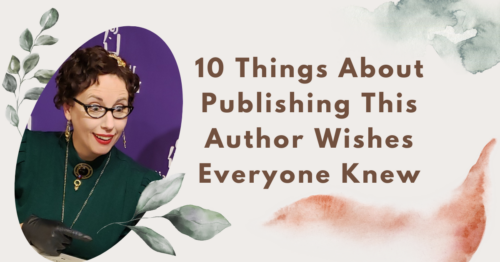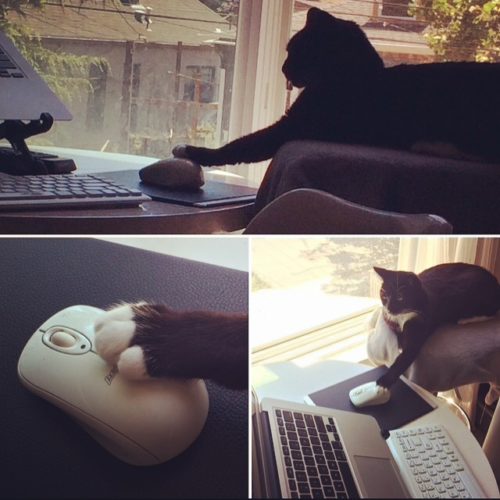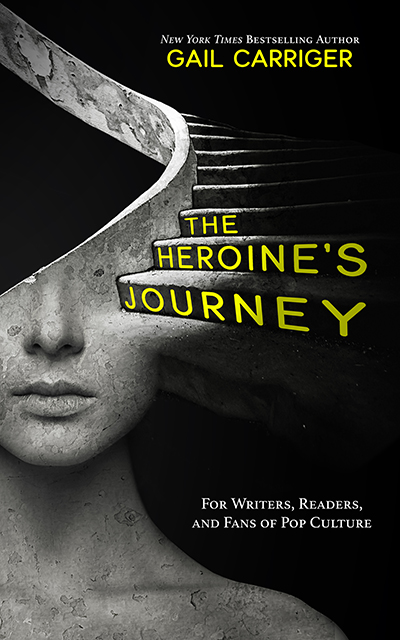90% of the questions I get asked stem from preconceived notions about the publishing industry. I had them too, before I became immersed. So without further ado, here are some things I really wish EVERYONE knew about publishing.

1. Most authors have day jobs.
Even if the author is a full timer, most of their day is likely not spent writing, and most put in at least 12 hour days. A startling few number of authors, including your very favorites, are full time writers. Even those fiction authors who are full times often augment their income with non-fiction, teaching, speaking gigs, courses, and coaching.
2. Payment is (generally) monthly in indie & bi-annually in trad.
Did you read that? Traditionally published authors are (if they are lucky) paid only 2x a year! Writing is not a get rich scheme. Even the most well-known authors make a great deal less money than you think they do. And whatever those “guesstimate lists” say. I know because I’ve shown up on a few of those and I may MUCH less than they claim.
3. The cover is the most important part of a book’s birth into the world.
Trad authors have too little control. Indie authors have too much. However, what you believe is a good cover (AKA pretty, nice, fun, representative) may not be a commercial or market-friendly cover. (There is also price to consider. But cover first.)
The cover is more like the label on a shampoo bottle than anything else. It functions to get people to pick up the book, click on it, read the blurb. It is a symbol of the book that hopes to attracts readers who will enjoy it and turn off those who won’t like it. (No book is liked by everyone.)
4. These terms as used by the publishing industry
- Trad means traditionally published with a paid advance, usually with one of the major publishers in New York (like Orbit, part of Hachette) or a small press (like Subterranean).
- Indie (mostly) means self published (or it may refer to an independent bookstore, I know, confusing).
- Hybrid means the author does both.
5. Authors can never expect anyone else to put in more effort than they do for their careers.
From writing a book to publicizing a book to reading it – no matter how much the author has paid or been paid, it ultimately comes down to them. Publishers, agents, and so for can/will only go so far. It’s the author’s name on the book, readers will look to them for every aspect of the book whether is comes under their locus of control or not, it will be perceived as such.
A book is a ton of work and just as much responsibility. That author you love is probubly working as hard, if not more so, on promoting their book as they did writing. And, everyone in publishing always expected them to.

You Shall Not Write
6. If an author is lucky enough to go on book tour, it usually means the following:
- The publisher is covering the costs.
- The author sells well enough already.
- The author doesn’t sell well enough to say no to touring, but probably wishes they could.
- The author’s presence is being used as a bargaining chip to leverage sales and/or future events.
7. In traditional publishing, new authors are basically paid by the successful proceeds of the heavy hitters that came before.
You may not enjoy that super popular book, but it’s likely that book is the reason you have the more-risky less-commercial novel that you love. My first book advance for Soulless probably came because my publisher was will to take a risk after the sucess of Twilight.
8. It helps to survive, as reader or writer, if you think of your beloved book as a marketable asset and not your precious baby.
That’s how everyone treats it. People are going to:
- slam it,
- abuse it,
- wrap it in trash,
- deny it,
- publish it with missing lines or typos,
- willfully misinterpret it,
- hate on it,
- and reject it without reading it.
Take a deep breath, move on to the next one.
9. An advance is called an advance for a reason
It means that the author is being “advanced money” and they will not be paid again until they earn enough in royalties to compensate for that advance.
If they don’t “earn out” they get to keep their advance, but it’s never good in trad if you’re not a profitable asset. Still confused? More on what advance really means.
10. A film option does not a movie make.
Look, in the end?
Traditional publisher or publishing venue (like Amazon) both are designed to get as much money out of authors and readers as possible.
This is not some weirdo personal vendetta against creatives, this is business.
Writers can feel pretty powerless in the big corporate world of publishing, but sometimes our greatest power is the ability to say “no.”
~ Carrie Vaughn
I fins myself talking about this and teaching it so often I put a teaching deck together about it. The weeds of trad and self publishing that are concrete basics no-one ever seems to have a handle on. If you deal with new authors AT ALL you should have me do this presentation for your local writers group or at your convention. No. Seriously. It’s called: Things I wish I knew first.
Yours (destined to be frustrated by publishing),
Miss Gail
10 More Installments of Gail blogging about publishing?
- 30+ Blogs & Podcasts for Authors
- 7 Tips for Getting Over Writer’s Block
- What is an author style guide? How about a style sheet?
- How to Write (and Not to Write) an Author Bio
- The Pros & Cons of Cons
- 7 Side Effects of Being a Full Time Author
- Pen Names, Cover Art & Reader Betrayal
- Plot Versus Pace (Why That Book Sucks)
- Learn to Let Go of the 10%
- Writing Humor
Find my books
Direct | Amazon | Kobo | Bookshop.org | B&N | Apple | Foyles | Mcnally Robinson | Angus Robertson
- Want more sneak peeks, free goodies, gossip, behind the scenes info? This stuff goes to my Chirrup members, because I love them bestest. Sign up here.
BOOK DE JOUR
- Tired of the hero’s journey?
- Frustrated that funny, romantic, and comforting stories aren’t taken seriously?
- Sad that the books and movies you love never seem to be critically acclaimed, even when they sell like crazy?
The Heroine’s Journey is here to help.
Multiple New York Times bestselling author Gail Carriger presents a clear concise analysis of the heroine’s journey, how it differs from the hero’s journey, and how you can use it to improve your writing and your life.
Tags: Beginning Writers, FAQ

Thank you for being candid! 🙂
Regarding #8: I am relieved to see that you don’t have full control of the finished product, as strange as that sounds. Having just finished reading Imprudence, I was shocked and appalled at the number of typos I found therein! Some of them were so ridiculous I just couldn’t fathom that Yourself had written them. The story and characters, naturally, were delightfully intriguing, and I am quite looking forward to reading their further adventures! But I’m sure you agree that mistakes are just so jarring, they toss one right out of the narrative flow and back into inconvenient reality. I hope your future endeavors include better proofreaders!!
Sage advice. I’m lucky I’m not serious about publishing my book. Writing it is, for now, just a pastime I like. In answer to Punkinberry, an editor tells me typos are everywhere and the author never knows they are writing them. Often the editor doesn’t even know they have just read them. Certainly, they are never placed in a manuscript on purpose.
Pingback: Loose-leaf Links #28 | Earl Grey Editing